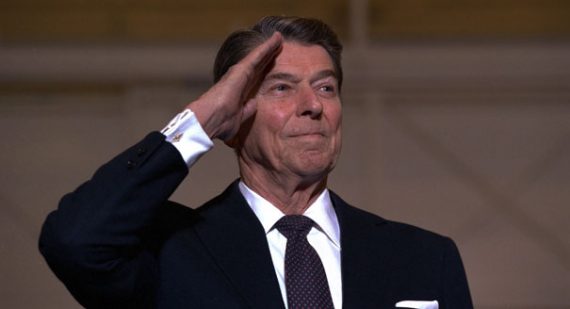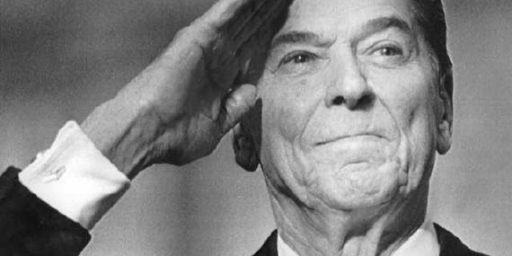Reflections On Ronald Reagan At 100
Ronald Reagan would have turned 100 today. Here are some thoughts on his legacy.
Pretty much everyone has commented already today about the 100th anniversary of Ronald Reagan’s birth, and what his legacy means not just for the Republican Party but for America as a whole. As one of those people who cut their political teeth on Ronald Reagan, the past couple days have been interesting because of the reflection back on a time that I remember quite well, and an Administration that started when I was in Middle School and ended when it was in my final years of college.
In order to really understand what Ronald Reagan meant to some of the people who are lionizing him today, you have to be able to understand what came before him. By the late 70s, America was, in may ways, a demoralized country. We had lost a war in Vietnam and ended up with a country divided. We lived through a President who broke the law, lied, and used the power of the state to prepare lists of Jewish people in the government, and investigate his “enemies.” The economy never really recovered from the tailspin it was forced into by the oil shock of the early 70s. Revolutionary governments were popping up in formerly friendly countries and seemingly on our own doorstep. When the Energy Crisis hit in the Carter Administration, our President told us that the answer was for everyone to turn down the thermostat and wear sweaters. Then, our embassy in Iran was taken over by a bunch of students and we found ourselves humiliated before the world.
By the time the 1980 election rolled around, America was, in many ways a demoralized country. As I said yesterday, one of the primary reasons for Reagan’s political success then was the fact he told Americans that this wasn’t the way it was supposed to be:
The Ronald Reagan I remember was an optimist who spoke of America as being the “shining city on the hill,” and who, even if in the depths of the Carter Malaise believed that the country’s best days were ahead of it, a sentiment that appeared throughout his major campaign speeches in 1980. One of the reasons Ronald Reagan was successful was because he brought that message of optimism at a time when the American public was becoming increasingly pessimistic.
Reagan once said that he believed that his greatest accomplishment was the fact that he made Americans feel proud of their country again. Given the state of things in the late 70s that was no small accomplishment and, along with his actual political successes and the role he played in bringing the Cold War to a peaceful conclusion, it strikes me as being one of the gifts that he gave America, and something we should be thankful for.
That’s not to say Ronald Reagan was perfect, though, because he wasn’t. He presided over massive increases in spending and the deficit that even he later said he regretted. He was slow to take action on the public health threat posed by AIDS. He stubbornly resisted efforts to bring an end to apartheid in South Africa (although that was largely influenced by the fact that the United States still looked at the world through a Cold War lens at the time). And, he engaged in a foolish endeavor to sell arms to terrorists in exchange for freedom for hostages, perhaps one of the biggest mistakes any President has made in connection with the Middle East in the modern era. Even conservatives, if they looked at the Reagan Presidency honestly, should be able to find flaws, whether it’s the aforementioned Iran-Contra scandal, or the fiscal irresponsibility.
Over at The Moderate Voice, though, Patrick Edaburn notes that both Reagan’s fans and detractors seem to be missing the point:
Obviously if you are a strong New Deal liberal who sincerely believes that big government is good and that the best system is one with a large role for the government in the economy/etc then you aren’t going to be a fan of Reagan’s policies any more than a small government conservative would be a fan of FDR or LBJ.
But in both cases you should be able to accept that even if you don’t like most of their policies, they did do some good things.
By the same token even if you are a huge fan of Reagan (or conversely LBJ/FDR) you should be able to accept that they made mistakes, that they were merely human beings and not demigods who should be free from any critcism.
Yet when I look at some of the commentaries on the net I can’t help but think that some people are not able to see this. For some Reagan never did anything right, for others he never did anything wrong. The truth of course lies somewhere in between.
Exactly. For me, Ronald Reagan was an inspiration and he was exactly the President America needed at the time he came along. He wasn’t perfect, though, and that was apparent to me even at the time he was in office. Mindless hagiography that ignores those flaws is as useless as the mindless detractors who ignore the undeniably good things about the Reagan era. Moreover, deifying Ronald Reagan ignores the fact that was, like all of us, a man and all men have their flaws. Rather than ignoring them or exaggerating them, acknowledging them gives us a more complete picture of a man who, in many ways, was the exemplar of the journey that America took in the 20th Century.
In closing, I’m embedding below the full video of Reagan’s Farewell Address given from the Oval Office on January 15, 1989. For 20 minutes, Reagan reflected on the journey that was just coming to an end, but also concentrated on the future, and, always, he saw good days ahead:
The past few days when I’ve been at that window upstairs, I’ve thought a bit of the ‘shining city upon a hill.’ The phrase comes from John Winthrop, who wrote it to describe the America he imagined. What he imagined was important because he was an early Pilgrim, an early freedom man. He journeyed here on what today we’d call a little wooden boat; and like the other Pilgrims, he was looking for a home that would be free. I’ve spoken of the shining city all my political life, but I don’t know if I ever quite communicated what I saw when I said it. But in my mind it was a tall, proud city built on rocks stronger than oceans, windswept, God-blessed, and teeming with people of all kinds living in harmony and peace; a city with free ports that hummed with commerce and creativity. And if there had to be city walls, the walls had doors and the doors were open to anyone with the will and the heart to get here. That’s how I saw it, and see it still.
And how stands the city on this winter night? More prosperous, more secure, and happier than it was 8 years ago. But more than that: After 200 years, two centuries, she still stands strong and true on the granite ridge, and her glow has held steady no matter what storm. And she’s still a beacon, still a magnet for all who must have freedom, for all the pilgrims from all the lost places who are hurtling through the darkness, toward home.
We’ve done our part. And as I walk off into the city streets, a final word to the men and women of the Reagan Revolution, the men and women across America who for 8 years did the work that brought America back. My friends: We did it. We weren’t just marking time. We made a difference. We made the city stronger; we made the city freer; and we left her in good hands. All in all, not bad — not bad at all.
No Mr. President, not bad at all.







> When the Energy Crisis hit in the Carter Administration, our President told us that the answer was for everyone to turn down the thermostat and wear sweaters.
Yea. He also told us we needed to get real about our energy problems and end our dependence on oil. The right crucified him. If we had listened to Carter, we might be in better shape. Instead, we are in exactly the same pickle. Well, except is is probably worse.
anjin,
Every President for the last 40 years has said that:
http://www.thedailyshow.com/watch/wed-june-16-2010/an-energy-independent-future
> Every President for the last 40 years has said that:
So? Carter presented a reasonable analysis of our energy problems fairly early in the game. The right’s response was to trash him. Are you denying that, or denying that if we had acted upon some of his ideas we might well be better off today?
Carter was a weak leader, I am not arguing that (though I find him to be a very admirable person). Just saying you might want to be a bit more balanced in your treatment of him.
Man, those were the days. I was part of the Alex P. Keaton generation.
(Actually, I opposed the MX Missile and “trees cause smog” so I wan’t a total cartoon Republican.)
As an American, I believe it’s my God-given right to never have to wear a sweater. Tell me what I want to hear!
It’s funny how you’ll see OTBers complain that no political leader wants to tell the real story about the deficit (for instance), but when faced with a situation in which a political leader told a hard truth — suggested unpleasant but generally mild sacrifice from Americans — they contine the decades-long pile-on, mocking the guy who was a straight shooter and praising the guy who said we could have our cake and eat it too.
Gee, why is it that politicians refuse to be honest about the deficit? Could it be because we’re not willing to accept anything but head-pats and cheers?
Imagine Barack Obama saying …
In this present crisis, government is not the solution to our problem; government is the problem. From time to time we’ve been tempted to believe that society has become too complex to be managed by self-rule, that government by an elite group is superior to government for, by, and of the people. Well, if no one among us is capable of governing himself, then who among us has the capacity to govern someone else? All of us together, in and out of government, must bear the burden. — Ronald Reagan
… I can’t either.